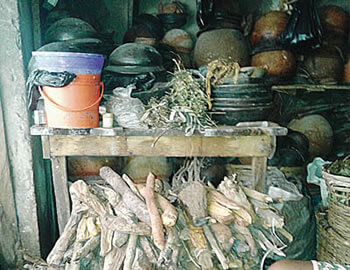AGAINST the backdrop of the recession in the country, former chairman of the Independent National Electoral Commission (INEC), Professor Maurice Iwu, has for some time been drawing attention to the fact that Nigeria has what it takes to diversify its economy through earnings from traditional and herbal medicines. On one occasion, the renowned expert in pharmacognosy said: “There are over 48 commercial plants in Nigeria and 30 of these plants are food plants. We are hoping that, one day, herbal medicine practitioners will be able to look at the global trend and key into it. We are convinced that traditional medicine is the key to the future of Nigeria’s health system. We have a lot of functional foods like cashew nuts; cocoa is an antioxidant proven to fight cardiovascular diseases, and we also have dogonyaro. What we lack mainly is awareness of the abundance of these herbs. Even today, many don’t know the efficacy of bitter leaf, which is good for fighting diabetes.” Iwu’s position is in perfect agreement with the observation of the director of the Nigeria Export Promotion Council (NEPC), Mr Segun Awolowo, that the time has come for the country to look in the direction of non-oil exports.
In the past 25 years at least, the world has tilted towards natural remedies for numerous ailments, especially in the light of the many deleterious side effects of synthetic drugs. The moringa seed which has become a universal wonder seed offering proven relief to numerous health conditions from high blood pressure to piles and haemorrhoids, grows and flourishes all over the country and can be found in many markets. Similarly, the sour sop plant, reputed to be an effective prophylaxis for cancer and diabetes, is generously available in the country.
Although a few states recognise herbal medicine and actually have boards that control the activities of its practitioners, the nation is yet to put in place a comprehensive blueprint to structure and regulate this area of potential national growth and global influence. The government should show more than a passing interest in developing this area by encouraging research and development in pharmacognosy. This can be done by supporting research institutes in the relevant areas of pharmacognosy through grants. This will go a long way in harnessing this potentially great sector of the economy which has been neglected over the years.
Already, the Nigerian market is awash with the Chinese variant of herbal medicine and there is evidence that China has been making more than a brisk business in Nigeria. What stops Nigeria from taking a similar step? If the government kindles the interest of the people in this area, they will embark on the cultivation of acres of land for these plants like lemon, lime moringa and sour sop. Lemon planted in an acre of land will actually fetch a lot of money. Apart from saving the lives of citizens who may otherwise die prematurely, this initiative will offer alternative livelihood to a country hooked on rent. The eventual operations of the sector will enjoy a transparent and independent supervision, unlike the oil sector which is criminally opaque and out of control.
As the people cultivate the land for food, so will they cultivate these crops for which alternative uses have been identified, and the country will be the richer for it. There are efforts already being made at the Obafemi Awolowo University’s Faculty of Pharmacy and similar faculties in other universities to develop herbal medicine, not to mention a private initiative in Edo State where herbal medicine has been upgraded. The global trend in medicine even favours a preference for organic and natural drugs over chemicals, and the country will do well to seize the advantage of nature’s blessings and endowments to diversify its economy.
Apart from saving lives, Nigeria will make a lot of money because, in the age of the internet, Nigeria’s practitioners of herbal medicine have a global market that they can explore, not to mention the foreign exchange that will be saved when the sector has been effectively keyed into by the federal and state governments through policy frameworks and funding. The practice of herbal medicine should be elevated and structured to be ready for the export market. The current sad and painful experiences fostered by economic recession should actually spur the country to seek a more productive alternative national livelihood. Nigeria needs to get out of the economic quicksand where it is currently mired.
WATCH TOP VIDEOS FROM NIGERIAN TRIBUNE TV
- Let’s Talk About SELF-AWARENESS
- Is Your Confidence Mistaken for Pride? Let’s talk about it
- Is Etiquette About Perfection…Or Just Not Being Rude?
- Top Psychologist Reveal 3 Signs You’re Struggling With Imposter Syndrome
- Do You Pick Up Work-Related Calls at Midnight or Never? Let’s Talk About Boundaries






